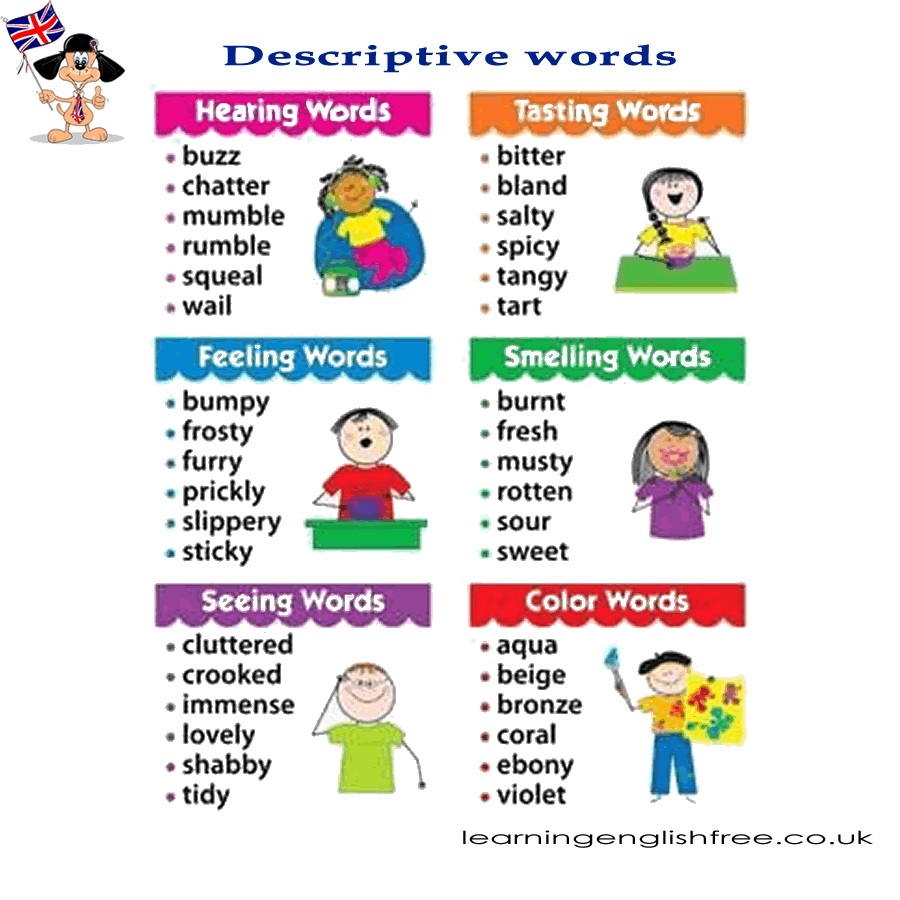Bringing Scenes to Life with Vivid Vocabulary
Introduction to Descriptive Vocabulary:
Descriptive words in English offer a rich tapestry for effectively conveying emotions, experiences, and observations. In this comprehensive lesson, we will delve into an array of descriptive words across various categories, such as hearing, feeling, seeing, smelling, and colours. Understanding and utilizing these words can dramatically enhance the way you describe the world around you, both in spoken and written English. This lesson aims not only to broaden your vocabulary but also to enrich your communication with more nuanced and vivid descriptions.
Exploring Descriptive Words Across Senses:
Hearing Words:
Buzz: a continuous, low sound like a bee.
E.g., "The buzz of the city was omnipresent."
Bitter: a harsh, disagreeable sound.
E.g., "Her voice was bitter with disappointment."
Chatter: continuous, high-pitched talking.
E.g., "The chatter in the café created a lively atmosphere."
Mumble: speaking softly and indistinctly.
E.g., "He mumbled his response, looking away."
Rumble: a deep, heavy, continuous sound.
E.g., "The distant rumble of thunder warned of the approaching storm."
Bland: lacking strong, defining features.
E.g., "The music in the elevator was uninterestingly bland."
Squeal: a long, high-pitched cry or noise.
E.g., "The children's squeals of delight filled the room."
Wail: a prolonged, high-pitched cry of distress.
E.g., "A police siren wailed in the distance."
Feeling Words:
Bumpy: having an uneven surface. E.g., "The bumpy road made the car shake."
Frosty: extremely cold with a layer of frost. E.g., "Her hands were frosty from the winter air."
Furry: covered with thick, soft hair. E.g., "The dog's furry coat was warm to the touch."
Prickly: having sharp points. E.g., "The prickly thorns deterred them from picking the roses."
Slippery: causing sliding, not firm. E.g., "The floor was slippery after being mopped."
Sticky: tending to adhere to objects upon contact. E.g., "The kitchen table was sticky from the spilt syrup."
Seeing Words:
Cluttered: filled with a disordered amount of items.
E.g., "His desk was cluttered with papers and books."
Crooked: not straight, bent, or twisted.
E.g., "The picture frame hung crooked on the wall."
Immense: extremely large or great.
E.g., "They stood before the immense ocean, feeling awed."
Salty: tasting of or containing salt.
E.g., "The sea air was tangibly salty."
Spicy: having a strong, hot flavour.
E.g., "The curry was delightfully spicy."
Tangy: having a strong, piquant flavour or smell.
E.g., "The lemon cake had a tangy zest to it."
Tart: having a sharp taste, often sour.
E.g., "The green apples were pleasantly tart."
Smelling Words:
Burnt: having the smell or taste of something that has been burned.
E.g., "The smell of burnt toast wafted from the kitchen."
Fresh: clean, pure, and not stale.
E.g., "The fresh scent of pine filled the forest."
Musty: having a stale, mouldy, or damp smell.
E.g., "The old books had a musty odour."
Rotten: decayed or decomposed.
E.g., "The rotten fruit emitted an unpleasant smell."
Sour: having an acidic taste or character.
E.g., "The milk smelled somewhat sour."
Sweet: pleasing to the senses; usually associated with sugary taste.
E.g., "The sweet aroma of the roses filled the garden."
Colour Words:
Aqua: a light shade of blue and green.
E.g., "She loved the aqua tones of the sea."
Beige: a pale sandy yellow-brown colour.
E.g., "The walls were painted a neutral beige."
Bronze: a reddish-brown colour, like the metal bronze.
E.g., "The statue had a shiny bronze finish."
Coral: a reddish or pinkish shade of orange.
E.g., "The sunset turned the sky a brilliant coral."
Lovely: attractive or beautiful, especially in a graceful way.
E.g., "The garden was filled with lovely hues."
Shabby: showing signs of wear and tear.
E.g., "The old chair looked rather shabby."
Tidy: neat and in good order.
E.g., "Her room was always impeccably tidy."
Ebony: a deep, dark black.
E.g., "The grand piano was an elegant shade of ebony."
Violet: a bluish-purple colour.
E.g., "The field was dotted with violet wildflowers."
Enhancing Your Descriptive Abilities
This lesson has provided a comprehensive exploration of descriptive words, enabling you to:
- Enhance Descriptive Skills: You now have a richer vocabulary to describe various sensory experiences vividly.
- Improve Communication: Your enhanced language skills will allow you to express yourself more clearly and engagingly.
- Broaden Understanding: You're now better equipped to understand and appreciate the nuances of descriptive language in English.
Retention Tips: Regular usage of these words in conversations or creative writing can reinforce your learning. Associating words with personal experiences or visual imagery can also be effective.
Discover more enriching lessons at www.facebook.com/learningenglishfree.co.uk and share your learning journey with our community!

